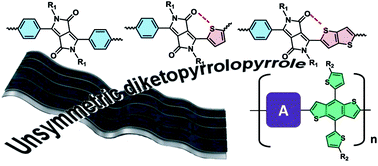Organic photovoltaics of diketopyrrolopyrrole copolymers with unsymmetric and regiorandom configuration of the side units†
Abstract
Diketopyrrolopyrrole (DPP) is a representative electron acceptor incorporated into narrow-bandgap polymers for organic photovoltaic cells (OPV). Commonly, identical aromatic units are attached to the sides of the DPP unit, forming symmetric DPP polymers. Herein we report the synthesis and characterization of DPP copolymers consisting of unsymmetric configurations of the side aromatics. The unsymmetric DPP copolymer with thienothiophene and benzene side moieties exhibits good solubility owing to the twisted dihedral angle at benzene and regiorandom configuration. A significant shallowing of the highest occupied molecular orbital level is observed in accordance with the electron-donating nature of the side units (benzene, thiophene, and thienothiophene). The overall power conversion efficiencies of the unsymmetric DPPs (2.3–2.4%) are greater than that of the centrosymmetric analogue (0.45%), which is discussed in view of bulk heterojunction morphology, polymer crystallinity, and space-charge-limited current mobilities. This comparative study highlights the effect of unsymmetric design on the molecular stacking and OPV performance of DPP copolymers.



 Please wait while we load your content...
Please wait while we load your content...